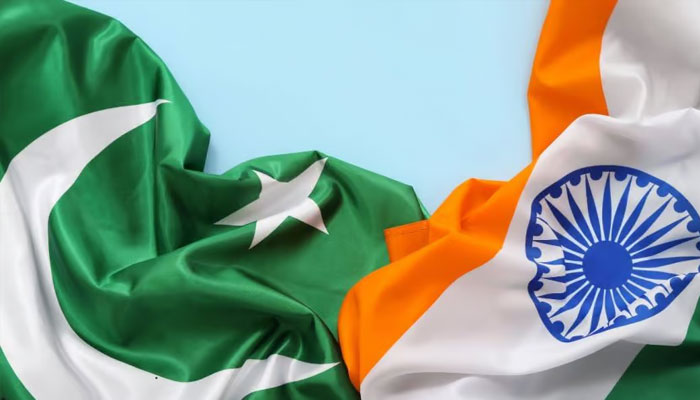India Alerts Pakistan of Floods, First Contact Since May Conflict
Islamabad Mission Conveys India’s Flood Alert to Pakistan on Aug 24 say sources
ISLAMABAD-(Mudassar Iqbal/Web Desk)- India has contacted Pakistan under the Indus Waters Treaty (IWT) to share information about potential flooding, official sources said.
According to the sources, New Delhi warned of a possible major flood in the Tawi River at Jammu. The Indian High Commission in Islamabad conveyed the alert on the morning of August 24, marking the first such significant contact since the Pakistan-India war in May.
Following the communication, Pakistani authorities issued precautionary warnings based on the information provided by India, the sources confirmed.
India suspended its participation in the Indus Waters Treaty (IWT) with Pakistan in April after the killing of 26 civilians in Indian Illegally Occupied Jammu and Kashmir (IIOJK), which New Delhi blames on Islamabad.
India may release Sutlej river water soon
Pakistan denies the charges, which led to the worst fighting between the countries in decades before a ceasefire was agreed last week.
The treaty had survived three wars and other conflicts between the bitter rivals, while withstanding many twists and turns in diplomatic ties.
Reuters reported on May 16 that Delhi is considering projects that would likely reduce the flow of water into Pakistan from rivers allocated to that country.
India has said that it will “keep the treaty in abeyance until Pakistan credibly and irrevocably abjures its support for cross-border terrorism.” In contrast, Islamabad says “any attempt to stop or divert the flow of water belonging to Pakistan” will be an “act of war”.
Indus Waters Treaty: A Source of Persistent Disputes
The nuclear-armed neighbours remain at odds over the use of rivers that flow downstream from India into Pakistan’s Indus River basin. Their water sharing is governed by the Indus Waters Treaty (IWT), mediated by the World Bank and signed in September 1960.
Under the accord, the Indus and its tributaries were divided between the two countries: India received rights over the three eastern rivers — Sutlej, Beas and Ravi — while Pakistan was granted most of the waters of the three western rivers — Indus, Jhelum and Chenab. The treaty includes a clear dispute resolution mechanism and does not allow either side to unilaterally suspend or terminate it.
For decades, the neighbours have sparred over multiple projects on the Indus system. Pakistan, heavily reliant on this water for hydropower and irrigation — which sustains nearly 80% of its agriculture — accuses India of unfairly diverting flows through upstream dams and barrages. India rejects the charge, maintaining that its Kishanganga and Ratle hydroelectric projects comply with the treaty.
Islamabad has sought intervention by a neutral expert and arbitration court on these projects, while New Delhi accuses Pakistan of deliberately dragging out the process. India has also demanded modifications to the treaty to prevent such delays in the future
Floods Claim 700 Lives in Pakistan: Calls Grow for Civil Defence Training
The suspension of the accord is not expected to have an immediate impact on the flow of water to Pakistan, as India does not have enough storage capacity. However, water at a key receiving point in Pakistan briefly fell by as much as 90% in early May after India started maintenance work on some Indus projects.
India’s move could also bring uncertainty to Pakistan’s agricultural system.
The suspension means India can stop sharing crucial information and data on the release of water from barrages/dams or on flooding, Indian officials said, adding that New Delhi will also not be obliged to release minimum amounts of water during the lean season.
When Rivers Become Frontlines: Pakistan’s Fight for Indus Water Rights
Pakistan says the treaty is a binding international agreement brokered by the World Bank and contains no provision for unilateral suspension.
Ghasharib Shaokat, the head of product at Pakistan Agriculture Research, called the treaty the backbone of the country’s agriculture sector.
“It puts our agricultural future on shaky ground. If water flows become erratic, the entire system takes a hit — especially irrigation-dependent crops such as wheat, rice, and sugarcane,” Shaokat said.
“Yields could drop. Costs could rise. Food prices would likely spike. And small-scale farmers, who already operate on thin margins, would bear the brunt of it.”
Khalid Hussain Baath, chairman of a national farmers’ union in Pakistan, painted the move as an act of belligerence.
“This is a true war,” Baath said from Lahore. “We already have a water shortage because of climate change. Low rainfall this year, and limited snow, means that the water level is already 20-25% lower than last year.”
In a major victory, the Permanent Court of Arbitration in The Hague issued a Supplemental Award in the IWT case, favouring Pakistan.
According to a statement issued by the government, Pakistan reiterated its commitment to resolving the issue under the framework of the Indus Waters Treaty and stressed the need for renewed diplomatic engagement between the two countries.
The arbitration court’s ruling confirmed that India’s unilateral actions could not undermine the jurisdiction of either the court of arbitration or the Neutral Expert in proceedings under the IWT.
“Court has affirmed its competence in light of recent developments and that unilateral action by India cannot deprive either the Court or the Neutral Expert… of their competence to adjudicate the issues before them,” read the statement.




Comments are closed, but trackbacks and pingbacks are open.